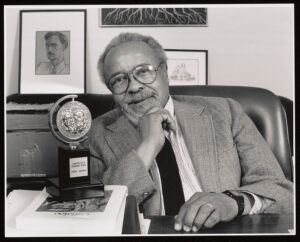
Lloyd Richards with his Tony Award for Best Direction for Fences, 1987. PHOTO c/o the Lloyd Richards Estate (Lloyd Richards Papers, Yale University).
Lloyd Richards (1919 – 2006) was born in Toronto and raised in Detroit. He entered Wayne University (now Wayne State) intending to become a lawyer, but due to a love of theatre, became a speech major. He joined the Army Air Corps in 1944 during World War II and earned his pilot wings at Tuskegee. After the war, he acted in two semiprofessional theatres in Detroit that he helped create, worked as a radio disc jockey, and was employed as a social worker for the Welfare Department. He moved to New York City in 1947, and worked as an actor in radio, Off-Broadway, and eventually Broadway. In 1956, his friend and former student Sidney Poitier enlisted him to direct A Raisin in the Sun by Lorraine Hansberry. It went on to artistic and commercial success on Broadway, and Richards became the first Black director nominated for the Tony Award for Best Direction.
He was a founding member of the Stage Directors and Choreographers Society (SDC) in 1959, and its President from 1970 to 1980. From 1968 until 1999, he headed the National Playwrights Conference (NPC) at the Eugene O’Neill Theatre Center, where he developed the work of John Guare, Derek Wolcott, Wole Soyenka, Israel Horovitz, Wendy Wasserstein, Christopher Durang, David Henry Hwang, John Patrick Shanley, Lee Blessing, Doug Wright, and Adam Rapp, among hundreds of others. In 1979, he was named Dean of the Yale School of Drama and the Artistic Director of Yale Repertory Theatre, where noted productions include three premieres by Athol Fugard. Richards went on to direct six new plays by Wilson while creating a vertically integrated developmental process that brought those plays from the O’Neill to Yale through a tour of regional theatres, culminating in premiere commercial productions on Broadway. This process proved so successful that during the 1987-1988 Broadway season, four plays he either directed or produced were running simultaneously. Richards won the Tony Award for Best Direction for August Wilson’s Fences in 1987 and the National Medal of Arts in 1993. He died on June 29, 2006, his 87th birthday.
